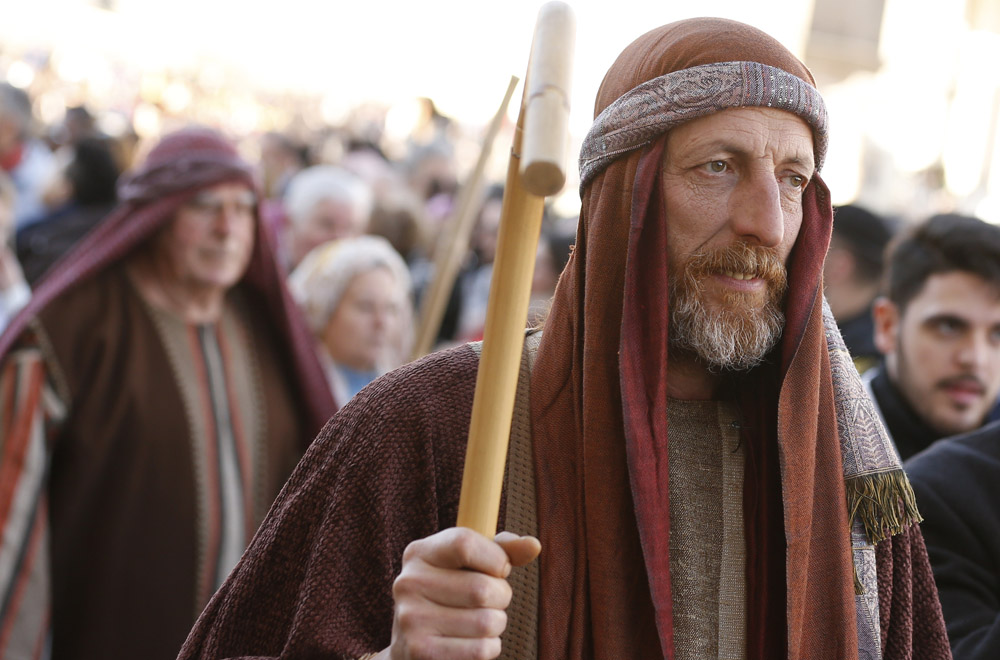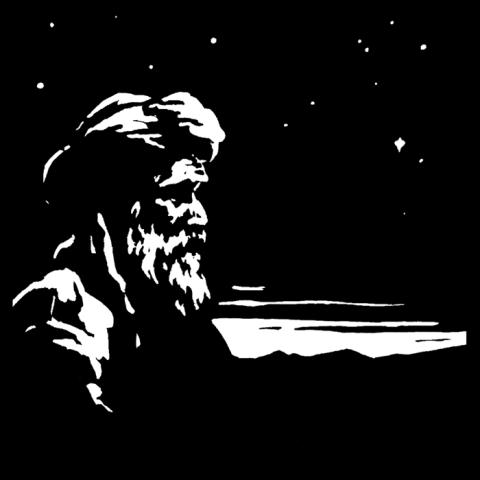
People participate in an parade marking the feast of the Epiphany in St. Peter's Square at the Vatican Jan. 6, 2018. (CNS/Paul Haring)
What would happen if a group of Romanian Gypsies or Afghan Muslims showed up at the parish, announcing that they had come to find the reformer who was about to make our church into what it ought to be?
Our answer depends partly on where we position ourselves and how much the current state of affairs benefits, disturbs or disfavors us. No matter our starting point, we might find it a little disconcerting that the visitors, enthusiastic about our change, have come from another culture and faith tradition.
Happily, the minute they admit that they got here by following a star, a good number of us would heave a sigh of relief and write them off as migrating citizens from a funny farm.
The Gospel of Matthew tells us that when a similar group showed up in Jerusalem around 6 B.C., King Herod and the religious leaders took them rather seriously. The travelers got their attention by using the "K-word."
The visitors said they were seeking a newborn whom they called the King of the Jews. Everybody familiar with their Bible stories knows that a king chosen by God can cause the reigning establishment a lot of trouble. So with a great show of religiosity, Herod gathered the theologians to help the pilgrim band understand where the prophets said the savior would be born.
As luck would have it, their wandering star coincided with the ancient prophecies, and the Magi soon found the child and his mother. Recognizing God's presence in him, they offered him homage and gave him gifts that represented their hearts. Then, as sensitive to dreams as to astral signs, they avoided Herod and his kind, went home, never again to appear in Christian history.
What would Matthew want us to take away from this story?
Some elements are easily discernable. One obvious component of the story is that God's presence can be discovered through creation: The star at Jesus' birth was the counterpoint to the darkness that came over the land at his death. It was a sign that although God's light may seem faint, it can never be snuffed out.

(Mark Bartholomew)
Then there is the irony that strangers were willing to go to great lengths to encounter Emmanuel, while the religious leaders of the chosen people were content with their theology and a Temple practice they had learned to manage.
The religious leaders of the day had forged an uneasy alliance with their Roman overlords. As long as they didn't make waves, they were allowed to keep the Temple running. Their ritual service gave them a living and did nothing to disturb the peace. Apparently, the priests and scribes had led their people to settle for formalism, counting on the idea that offering the right sacrifices would appease God just as their taxes satisfied Caesar.
When the restless Magi appeared and Herod asked the leaders to explain what their Scriptures foretold about a messiah, the chief priests and scribes could cite chapter and verse, all while remaining complacent, unaffected and incurious. That was their first step toward not only massively missing the point, but also developing a specialty of trying to thwart what God had begun to do through the newborn Jesus.
Today, the Magi story combines with our reading from Isaiah to remind us that Emmanuel is still waiting to be discovered in what we might think are the most unlikely places and by the most unlikely people.
It is improbable that a band of Gypsies or a group of Muslims is going to show up at our doors. At the same time, there are serious seekers, contemporary magi, all around us.
Advertisement
They are young people consciously hungry for a spiritual nourishment that they have not found in our churches and catechisms. They are women who feel they have been treated like unwelcome outsiders when they come to the temple to offer their gifts. They are the more than 10 percent of the U.S. population who identify as "former Catholics," because they have been injured, feel rejected or believe that the church has so betrayed her vocation that their conscience does not allow them to participate in it.
These people's sincere seeking, like that of the Magi, can be a wake-up call to those practicing in the church.
As we begin our new year, today's liturgy urges us to listen to the seekers who want more than they have found in conventional religion. Their searching reminds us that God is bigger than any ritual or tradition and is always waiting to encounter us anew, somewhere beyond our expectations.
[Mary M. McGlone is a Sister of St. Joseph currently writing the history of the Sisters of St. Joseph in the U.S.]
Editor's note: This Sunday Scripture commentary was originally published in the January 2019 issue of Celebration, a comprehensive pastoral resource. To read the full version of the commentary, click here. Sign up to receive weekly Scripture for Life emails.








